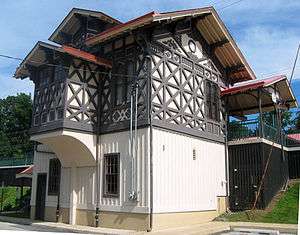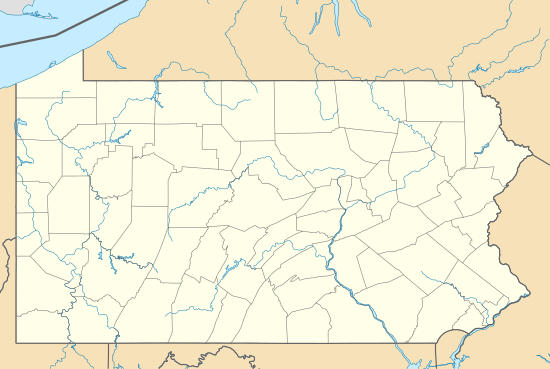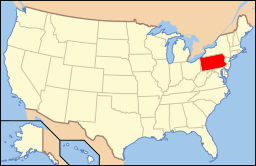Strafford station
| SEPTA Regional Rail commuter rail station | ||||||||||||||||||||||||||||
 | ||||||||||||||||||||||||||||
| Location |
97 Old Eagle School Road and Crestline Road Wayne, PA 19087 | |||||||||||||||||||||||||||
| Owned by | Amtrak[1] | |||||||||||||||||||||||||||
| Operated by | SEPTA | |||||||||||||||||||||||||||
| Line(s) |
Keystone Corridor (Main Line) | |||||||||||||||||||||||||||
| Platforms | 2 side platforms | |||||||||||||||||||||||||||
| Tracks | 4 | |||||||||||||||||||||||||||
| Construction | ||||||||||||||||||||||||||||
| Parking | 289 spaces (115 daily, 103 permit, 71 remote permit) | |||||||||||||||||||||||||||
| Bicycle facilities | 4 racks (8 spaces) | |||||||||||||||||||||||||||
| Disabled access | Yes | |||||||||||||||||||||||||||
| Other information | ||||||||||||||||||||||||||||
| Fare zone | 3 | |||||||||||||||||||||||||||
| History | ||||||||||||||||||||||||||||
| Opened | 1876 | |||||||||||||||||||||||||||
| Rebuilt | 1885, 1887, 1999–2002 | |||||||||||||||||||||||||||
| Electrified | September 11, 1915[2] | |||||||||||||||||||||||||||
| Traffic | ||||||||||||||||||||||||||||
| Passengers (2011) | 763[3] (weekday boardings) | |||||||||||||||||||||||||||
| Services | ||||||||||||||||||||||||||||
| ||||||||||||||||||||||||||||
| ||||||||||||||||||||||||||||
|
Strafford Railroad Station | ||||||||||||||||||||||||||||
  | ||||||||||||||||||||||||||||
| Location | Strafford, Pennsylvania | |||||||||||||||||||||||||||
| Coordinates | 40°02′59″N 75°24′14″W / 40.0496°N 75.4038°WCoordinates: 40°02′59″N 75°24′14″W / 40.0496°N 75.4038°W | |||||||||||||||||||||||||||
| Built | 1876 | |||||||||||||||||||||||||||
| Architectural style | Stick/Eastlake | |||||||||||||||||||||||||||
| NRHP reference # | 84003226 | |||||||||||||||||||||||||||
| Added to NRHP | 1984[4] | |||||||||||||||||||||||||||
Strafford station is a commuter rail station located in the western suburbs of Philadelphia at Old Eagle School Road and Crestline Road.[5] It is served by most Paoli/Thorndale Line trains.
In 1885, the building served as the railway station for Wayne, Pennsylvania. In 1887, the building was moved to its current location in Strafford. The station has also been damaged by fires numerous times. The landmark building was constructed in the "Eastlake" or "Stick" architectural style popular from 1855 to 1877.[6] In 1911 the Philadelphia and Western Railroad extended their Strafford Branch to the station which lasted until 1956. The train station was added to the National Register of Historic Places in 1984.
The Southeastern Pennsylvania Transportation Authority (SEPTA) restored the station from 1999 to 2002. Work included restoring the historic station building itself, the platforms, shelters, and canopies. The station was made ADA-compliant with ramps to the platforms. Mini-high-level platforms will be installed after the Amtrak Keystone Corridor project is complete.
The ticket office at this station is open weekdays from 5:50 a.m. to 1:15 p.m., excluding holidays. There are 289 parking spaces at the station, including SEPTA permit parking in nearby lots.
This station is 15.4 track miles from Philadelphia's Suburban Station. In 2011, the average total weekday boardings at this station was 763, and the average total weekday alightings was 775.[3]
Station layout
Strafford has two low-level side platforms with pathways connecting the platforms to the inner tracks.
| Platform level | ||
| Side platform, doors will open on the right | ||
| Track 4 | ← Paoli/Thorndale Line toward Paoli, Malvern or Thorndale (Devon) ← Keystone Corridor services do not stop here | |
| Track 3 | ← Paoli/Thorndale Line toward Paoli, Malvern or Thorndale (Devon) ← Keystone Corridor services do not stop here | |
| Track 2 | Keystone Corridor services do not stop here → Paoli/Thorndale Line toward Suburban Station or Temple University (Wayne) → | |
| Track 1 | Keystone Corridor services do not stop here → Paoli/Thorndale Line toward Suburban Station or Temple University (Wayne) → | |
| Side platform, doors will open on the right | ||
| G | Street level | Exit/entrance, station house, parking |
References
- ↑ "Transportation Planning for the Philadelphia–Harrisburg "Keystone" Railroad Corridor" (PDF). Federal Railroad Administration. Archived from the original on May 21, 2011. Retrieved 9 January 2013.
- ↑ Tatnall, Frank (Fall 2015). "A Century of Catenary". Classic Trains. 16 (3): 26.
- 1 2 "Fiscal Year 2011 Annual Service Plan" (PDF). SEPTA. pp. 71–72. Archived from the original (PDF) on 11 February 2013. Retrieved 12 January 2013.
- ↑ Chester County Listings at the National Register of Historic Places
- ↑ Google map
- ↑ John Milnes Baker, A.I.A. (1994) American House Styles p.86.
External links
![]()

